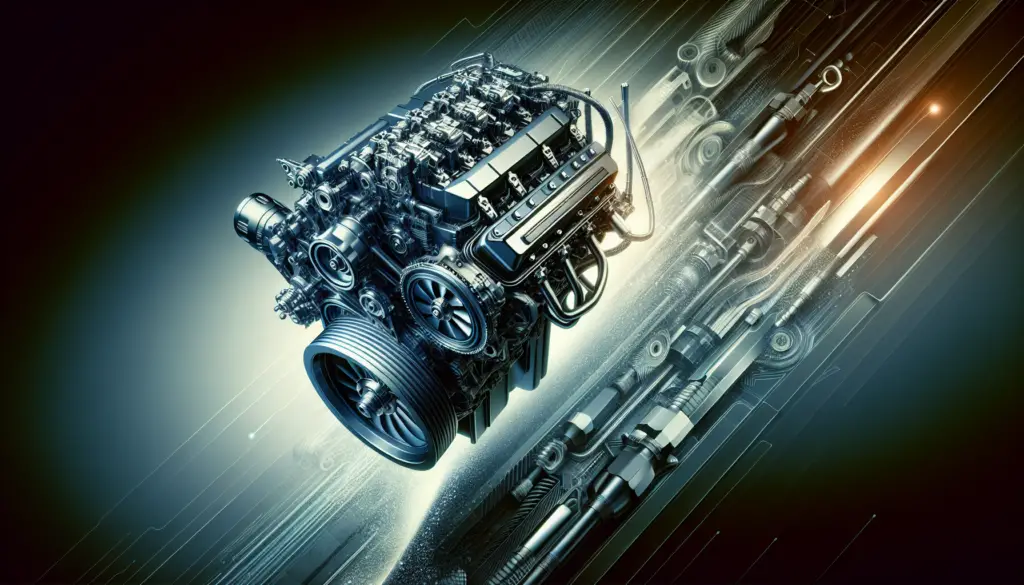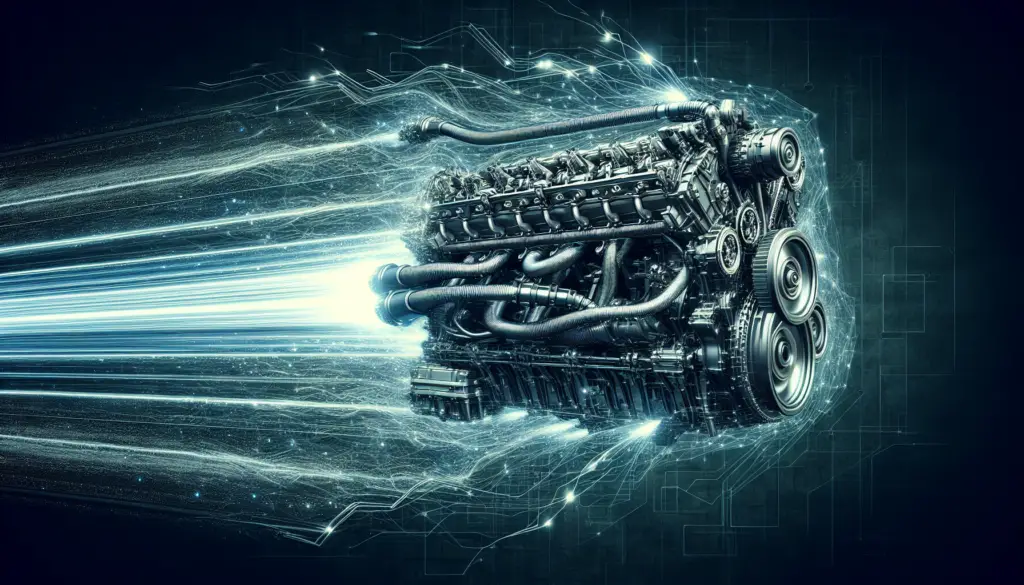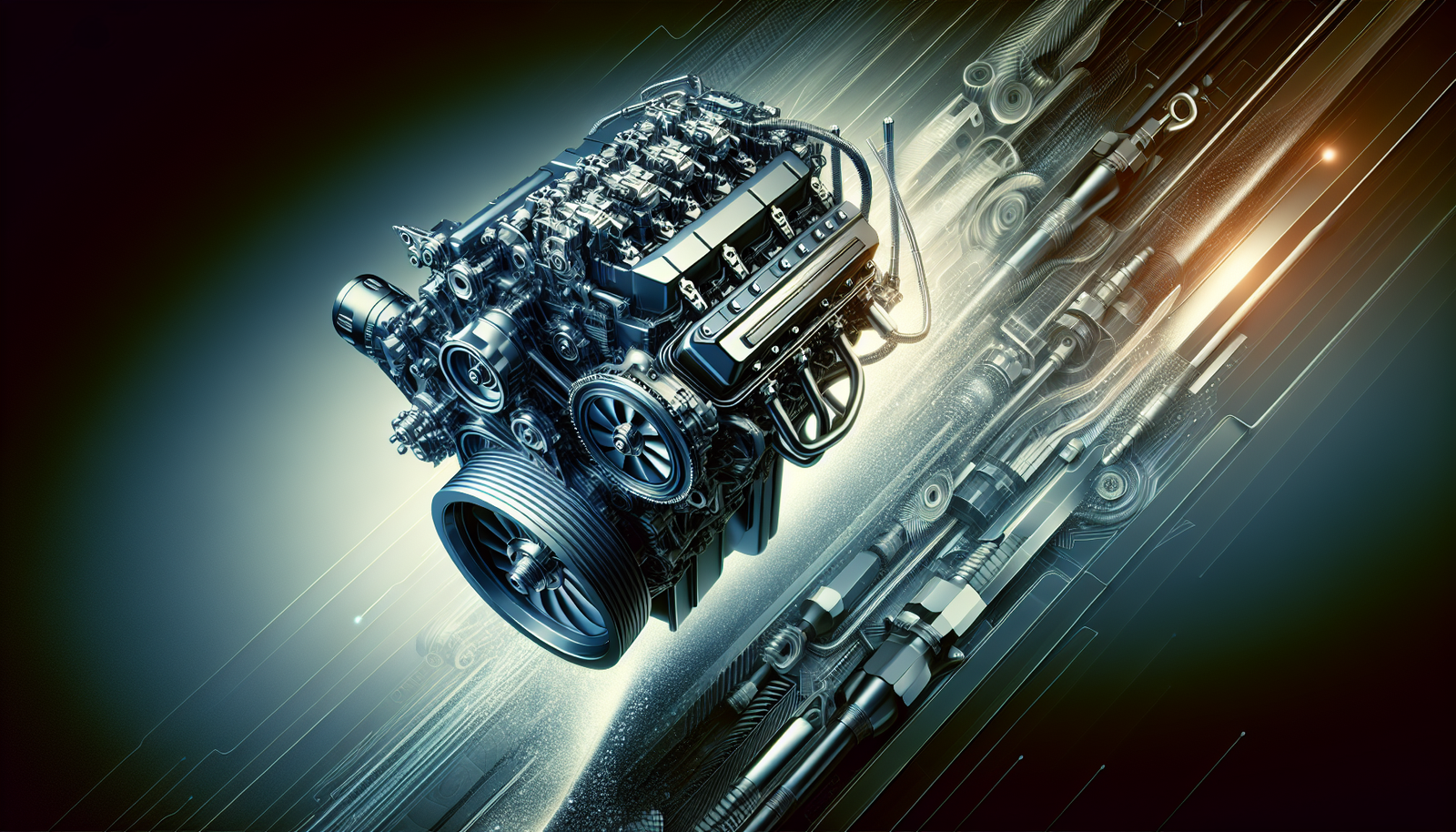You have finally decided to take your boating experience to the next level by upgrading your boat’s engine. Whether you are looking to improve speed, increase efficiency, or enhance overall performance, this ultimate guide to boat engine upgrades is here to assist you. From understanding different types of engines to evaluating power requirements and choosing the right upgrade for your specific needs, this comprehensive guide will provide you with all the information you need to make an informed decision and enjoy a smoother, more powerful ride on the open waters. So, buckle up and get ready to embark on an exciting journey of boat engine upgrades!
Choosing the Right Engine
When it comes to choosing the right engine for your boat, there are several factors that you need to consider. The type of boat you have, the size and power requirements, fuel efficiency, and the maintenance and serviceability of the engine are all important considerations.
Factors to Consider
Before making a decision, it’s important to think about the type of boat you have and what you plan to use it for. Different types of boats require different engine types. For example, a small recreational boat may not need the same type of engine as a large fishing boat or a speedboat.
Another factor to consider is the size and power requirements of your boat. Larger boats typically require more powerful engines to ensure adequate propulsion. Additionally, think about the weight of your boat and how many people it can accommodate. These factors will determine the engine size and power you need.
Fuel efficiency is another crucial consideration. Fuel costs can add up quickly, so finding an engine that is fuel-efficient can save you money in the long run. Additionally, a fuel-efficient engine will have a lower impact on the environment.
Finally, think about the maintenance and serviceability of the engine. Regular maintenance and servicing are essential to keep your engine running smoothly and prevent breakdowns. Consider the availability of parts and service providers for the engine you are considering.
Types of Boat Engines
There are several types of boat engines to choose from, each with its own advantages and disadvantages. The most common types include outboard, inboard, sterndrive, and jet engines.
Outboard engines are the most popular choice for small to medium-sized boats. They are easily portable, versatile, and offer a good power-to-weight ratio. Inboard engines, on the other hand, are permanently fixed inside the boat’s hull. They provide excellent maneuverability and can be more fuel-efficient than outboard engines.
Sterndrive engines combine the benefits of both outboard and inboard engines. They are installed inside the boat but have the propeller outside the hull. Sterndrive engines offer good handling and performance. Jet engines use water propulsion instead of a traditional propeller. They are commonly used in jet boats and offer excellent maneuverability but are not as fuel-efficient as other types of engines.
Considering the type of boat you have and your specific needs will help you determine which type of engine is the right choice for you.
Engine Size and Power
The size and power of the engine you choose for your boat will depend on several factors, including the size and weight of your boat, the number of people it can accommodate, and the type of activity you plan to engage in.
It’s important to choose an engine that provides enough power to propel your boat efficiently and safely. Underpowering your boat can lead to reduced performance and difficulties in maneuvering, especially in adverse weather conditions. Overpowering your boat, on the other hand, can lead to excessive fuel consumption, higher maintenance costs, and safety concerns.
Manufacturers provide guidelines and recommendations for the appropriate engine size and power for their boats. Consulting these recommendations and working with professionals can ensure that you choose the right engine for your specific needs.
Fuel Efficiency
Fuel efficiency is an important consideration when choosing an engine for your boat. Fuel costs can put a significant dent in your budget, so finding an engine that offers good fuel efficiency can save you money in the long run.
Modern engines are designed to be more fuel-efficient, but there are still differences between models and types of engines. Smaller, lightweight boats tend to be more fuel-efficient, as they require less power to propel through the water.
Another factor that can impact fuel efficiency is the type of fuel used. Some engines are designed to run on specific types of fuel, while others can be adapted to use different fuels. Consider the availability and cost of the fuel you plan to use when choosing an engine.
Additionally, regular maintenance and servicing can help improve fuel efficiency. Keeping your engine clean, replacing air and fuel filters, and ensuring that the engine is properly tuned can all contribute to better fuel economy.
Maintenance and Serviceability
Proper maintenance and regular servicing are crucial for keeping your boat engine running smoothly and efficiently. Neglecting maintenance can lead to decreased performance, increased fuel consumption, and even engine failure.
When choosing an engine, consider the availability of parts and service providers. It’s important to choose an engine brand and model that has a good reputation for reliability and is supported by a network of service centers. This will ensure that you can easily find spare parts and get your engine serviced when needed.
Regular maintenance tasks include changing oil and filters, inspecting belts and hoses, checking the cooling system, and cleaning the fuel system. It’s essential to follow the manufacturer’s recommendations for maintenance intervals and procedures.
Seeking professional help for engine maintenance and servicing is highly recommended. Qualified professionals have the knowledge and experience to properly care for your engine and can identify and address any potential issues before they become major problems.
Engine Performance Upgrades
If you’re looking to enhance your boat’s performance, there are several engine upgrades that you can consider. These upgrades can increase horsepower, improve torque, enhance fuel efficiency, optimize engine cooling, and more. Depending on your specific needs and goals, you can choose the upgrades that will make the most difference for your boating experience.
Increasing Horsepower
One of the most sought-after engine performance upgrades is increasing horsepower. More horsepower means more speed and better acceleration, which can be particularly important for speedboats and those involved in racing.
There are various ways to increase horsepower, including installing a higher-performance intake and exhaust system, upgrading the fuel system, and optimizing ignition timing. It’s important to note that increasing horsepower may require other modifications to ensure that the engine can handle the increased power.
Improving Torque
Torque is another important aspect of engine performance, especially for boats used for towing or carrying heavy loads. Improving torque can enhance acceleration and pulling power, making it easier to handle challenging conditions.
To improve torque, you can consider upgrading the engine’s camshaft, installing a higher-performance exhaust system, or making changes to the engine’s air intake system. These modifications can help optimize the engine’s power delivery and increase low-end torque.
Enhancing Fuel Efficiency
Not only can engine upgrades improve performance, but they can also enhance fuel efficiency. By optimizing the combustion process and improving airflow, you can reduce fuel consumption and extend your boat’s range.
Upgrading the engine’s air intake and exhaust system, installing a more efficient fuel injection system, and optimizing ignition timing are all ways to improve fuel efficiency. Additionally, regular maintenance, such as replacing air and fuel filters and keeping the engine properly tuned, can also contribute to better fuel economy.
Optimizing Engine Cooling
Efficient engine cooling is crucial for maintaining optimal performance and preventing overheating. Upgrading the engine’s cooling system can ensure that the engine operates at the right temperature, even in demanding conditions.
Upgraded cooling systems, such as larger radiators and high-flow water pumps, can help improve heat dissipation and reduce the risk of overheating. Additionally, optimizing the coolant’s composition and flow can further enhance cooling efficiency.
Upgrade Options and Costs
The cost of engine performance upgrades can vary greatly depending on the type of upgrade, the specific parts used, and whether you choose to have a professional handle the installation. It’s important to consider both the upfront cost of the upgrades and any potential long-term costs, such as increased maintenance needs.
Before diving into engine upgrades, it’s recommended to consult with professionals who specialize in boat engines. They can assess your specific needs and goals and recommend the most suitable upgrades for your boat. Additionally, they can provide guidance on the costs involved and the impact the upgrades may have on your boat’s warranty.

Installing Engine Modifications
Once you’ve chosen the engine upgrades you want to pursue, it’s time to think about the installation process. Depending on the complexity of the modifications, you may choose to work with professionals or take a do-it-yourself (DIY) approach.
Working with Professionals
For complex engine modifications, such as upgrading the fuel system or installing forced induction, it’s highly recommended to work with professionals. Qualified technicians have the knowledge, experience, and specialized tools to handle the installation process safely and effectively.
By working with professionals, you can ensure that the modifications are done correctly and that any potential issues or risks are addressed. They can also provide valuable insights and recommendations based on their expertise in boat engine modifications.
DIY Modifications
If you have the necessary mechanical skills and experience, you may choose to undertake certain engine modifications on your own. However, it’s important to note that DIY modifications come with risks and challenges.
Before diving into DIY modifications, thoroughly research the process and understand the specific requirements and potential risks. Ensure that you have the necessary tools and equipment and follow the manufacturer’s instructions carefully.
It’s also a good idea to consult with professionals or experienced boaters who have successfully completed similar modifications. They can provide guidance, offer tips and tricks, and help you navigate any challenges you may encounter.
Understanding Safety Regulations
When modifying your boat engine, it’s important to understand and comply with safety regulations that are in place to protect you and other boaters. Regulations may vary depending on your location and the type of modifications you are making.
Certain modifications, such as changes to the exhaust system, may have specific noise regulations that need to be followed. Other modifications, such as altering the fuel system, may require compliance with safety standards to prevent fuel leaks or fires.
Before starting any modifications, familiarize yourself with the relevant regulations and consult with professionals who can advise you on compliance. It’s important to prioritize safety and ensure that your modifications do not compromise the integrity or operation of your boat.
Tools and Equipment
Having the right tools and equipment is essential for installing engine modifications safely and effectively. Depending on the specific modifications you plan to make, you may need a variety of tools, including wrenches, sockets, pliers, and specialty tools.
It’s important to invest in high-quality tools that are appropriate for the specific tasks you will be performing. Using the wrong tools can lead to damage to the engine or components, and may compromise the safety and reliability of your boat.
Before starting any modifications, take the time to gather the necessary tools and equipment. Ensure that you have a safe and well-equipped workspace and follow all safety precautions outlined in the manufacturer’s instructions.
Upgrading Engine Fuel System
The fuel system is a critical component of your boat’s engine, and upgrading it can have a significant impact on performance and fuel efficiency. By making improvements to the fuel injection system, fuel pumps, filters, and more, you can enhance the overall operation of your engine.
Fuel Injection Systems
Upgrading your boat’s fuel injection system can improve fuel delivery and atomization, leading to better combustion and increased power. Modern fuel injection systems offer precise control over the fuel-air mixture and can adapt to changing conditions.
There are several types of fuel injection systems to choose from, including direct injection and multi-port injection. Direct injection systems inject fuel directly into the combustion chamber, resulting in improved efficiency and power. Multi-port injection systems inject fuel into the intake manifold before it reaches the cylinders.
When considering a fuel injection system upgrade, consult with professionals who can advise you on the most suitable option for your engine and help with the installation process.
Fuel Pumps and Filters
Upgrading your boat’s fuel pump and filters can help ensure that your engine receives a consistent and clean fuel supply. Fuel pumps are responsible for delivering fuel from the tank to the engine, while filters remove contaminants that could potentially damage the engine or reduce performance.
High-performance fuel pumps can provide better fuel flow and pressure, ensuring that your engine has an adequate supply of fuel at all times. Upgrading the fuel filters to higher-quality options can also improve filtration efficiency and protect your engine from harmful contaminants.
Consider consulting with professionals to determine the most suitable fuel pump and filter upgrades for your specific engine and boating needs.
Boosting Fuel Pressure
Increasing fuel pressure can provide additional power and performance benefits, especially when combined with other engine modifications. Higher fuel pressure ensures a more efficient combustion process, resulting in improved power delivery and responsiveness.
There are several methods to increase fuel pressure, depending on the type of fuel injection system your engine has. Consult with professionals who specialize in engine modifications to determine the most appropriate method for your specific setup.
Installing a Fuel Stabilizer
Fuel stabilizers are additives that help prevent fuel degradation and contamination. They are particularly useful for boats that are stored for extended periods or for engines that are not used frequently.
Stabilizers prevent the formation of varnish, gum, and other deposits that can clog fuel lines and injectors. They also help prevent the growth of microbes and bacteria, which can lead to fuel spoilage and engine damage.
Adding a fuel stabilizer to your boat’s fuel tank before storage or when fueling up can help protect your engine and ensure its proper operation when you’re ready to hit the water again.
Understanding Ethanol and Biofuels
Ethanol and biofuels are alternative fuel options that are becoming more widely used in boats. Understanding their properties and potential impact on your engine is crucial when considering engine upgrades.
Ethanol is an alcohol-based fuel that can be blended with gasoline. While it offers some environmental benefits, ethanol can have negative effects on certain types of engines and fuel systems. It can cause corrosion, fuel system damage, and other issues if not properly managed.
Biofuels, on the other hand, are derived from renewable sources such as plant materials or cooking oil. They offer potential environmental advantages, but it’s important to ensure that your engine is compatible with the specific type of biofuel you plan to use.
Before upgrading your engine or making any modifications to accommodate alternative fuels, consult with professionals who can provide guidance on compatibility and help you make informed decisions.

Enhancing Engine Cooling
Efficient engine cooling is vital for maintaining optimal performance and preventing overheating. Upgrading your boat’s cooling system can help ensure that your engine operates at the correct temperature, even in demanding conditions.
Upgraded Cooling Systems
Upgrading your boat’s cooling system can involve several components, including the radiator, water pump, and hoses. High-performance radiators offer improved cooling efficiency and heat dissipation, which can be beneficial for engines that generate a lot of heat.
Water pump upgrades can provide increased coolant flow, ensuring that the engine is properly cooled. Additionally, upgrading the hoses to higher-quality options can prevent leaks and ensure reliable coolant circulation.
When considering cooling system upgrades, consult with professionals who can assess your engine’s specific needs and recommend the most suitable options.
Water Pump and Impeller Upgrades
The water pump and impeller play a critical role in cooling the engine. Upgrading to a higher-performance water pump can improve coolant flow and enhance heat dissipation.
The impeller, which is responsible for circulating coolant through the cooling system, can also be upgraded. High-performance impellers are designed to move more water with less effort, providing better cooling performance.
Consult with professionals who specialize in boat engine modifications to determine the most suitable water pump and impeller upgrades for your specific setup.
Choosing the Right Coolant
The type of coolant you use in your boat’s engine can significantly impact its cooling performance and overall operation. Choosing the right coolant is essential for preventing corrosion, maintaining proper temperature regulation, and extending the life of your engine.
Many engine manufacturers specify the type of coolant that should be used in their engines, so it’s important to follow their recommendations. Typically, antifreeze/coolants that contain a mix of water and ethylene or propylene glycol are used.
When selecting a coolant, ensure that it is compatible with your engine’s materials and meets the necessary standards. Proper coolant maintenance, including regular flushing and replacement, is also important for optimal cooling system performance.
Importance of Correct Water Flow
Proper water flow is crucial for effective engine cooling. Upgrading your boat’s cooling system can help optimize water flow and ensure that the engine remains at the appropriate temperature.
Ensuring that the water intake is clear of debris and obstructions is essential for maintaining unobstructed water flow. Additionally, properly routing and securing the hoses can prevent kinks or leaks that could impede water circulation.
It’s also important to check that the water pump is functioning correctly. A faulty water pump can restrict water flow and lead to inadequate cooling. Upgrading the water pump can help ensure that the engine receives a consistent and sufficient supply of coolant.
Thermostat and Radiator Modifications
The thermostat and radiator are critical components of your boat’s cooling system. Upgrading them can help improve cooling efficiency and prevent overheating.
A higher-performance thermostat can provide better temperature regulation, opening and closing at the appropriate times to maintain the desired engine temperature. This can be particularly beneficial for engines that generate a lot of heat or are operated in extreme conditions.
Upgrading the radiator to a larger or more efficient model can also enhance cooling performance. High-performance radiators offer better heat dissipation, allowing the engine to operate at optimal temperatures even in challenging conditions.
Consult with professionals who specialize in cooling system modifications to determine which upgrades are most suitable for your specific engine and boating needs.
Engine Exhaust Upgrades
Upgrading your boat’s exhaust system can have a significant impact on performance, sound, and emissions. Improving exhaust flow and reducing backpressure can increase horsepower, enhance the engine’s sound, and potentially improve fuel efficiency.
Performance Exhaust Systems
Installing a performance exhaust system can help optimize the flow of exhaust gases and improve engine performance. Performance exhaust systems are designed with larger-diameter pipes and less restrictive mufflers to reduce backpressure and increase horsepower.
Performance exhaust systems can also provide a different sound character, with a deeper, more aggressive tone. However, it’s important to ensure that the sound level complies with noise regulations in your area, as excessive noise can result in fines or restrictions.
Mufflers and Silencers
Upgrading the muffler or installing a silencer can help reduce noise levels while still allowing for improved exhaust flow. Mufflers and silencers are designed to dampen the sound created by the engine’s exhaust gases, making boating more enjoyable for both you and those around you.
It’s important to choose mufflers or silencers that are designed specifically for marine use and comply with noise regulations. Additionally, consider the impact that any modifications to the exhaust system may have on the engine’s performance and fuel efficiency.
Understanding Noise Regulations
Noise regulations for boats vary depending on your location and the specific body of water you plan to operate in. It’s important to familiarize yourself with the noise regulations in your area and ensure that your boat’s exhaust system complies with the applicable standards.
Installing a performance exhaust system or making other modifications to the exhaust can potentially result in higher sound levels. Before making any modifications, consult with professionals who can provide guidance on noise regulations and help you choose the most suitable options for your engine and local regulations.
Dealing with Backpressure
Backpressure occurs when exhaust gases are restricted from exiting the engine quickly and efficiently. High levels of backpressure can reduce engine performance and potentially cause damage.
Upgrading the exhaust system to reduce backpressure can help increase horsepower and torque, as well as improve overall engine efficiency. This is typically achieved by installing larger-diameter pipes and using less restrictive mufflers.
Before making any modifications, consult with professionals who specialize in exhaust system upgrades. They can assess your engine’s specific needs and recommend the most suitable upgrades for optimal performance and compliance with noise regulations.
Exhaust Manifold and Header Upgrades
The exhaust manifold and headers are responsible for collecting and channeling exhaust gases out of the engine. Upgrading these components can improve exhaust flow and increase engine performance.
High-performance exhaust manifolds and headers are designed to reduce turbulence and allow for better scavenging of exhaust gases. They are typically made of materials that can withstand higher temperatures and provide improved durability.
Upgrading the exhaust manifold and headers can also result in a different sound character, with a more aggressive tone. Consult with professionals who specialize in engine modifications to determine the most suitable options for your specific engine and boating needs.

Upgrading Ignition System
The ignition system plays a crucial role in the overall performance and reliability of your boat’s engine. Upgrading key components of the ignition system can improve combustion, enhance spark delivery, and optimize timing, resulting in better power and efficiency.
Spark Plugs and Wires
Upgrading your boat’s spark plugs and ignition wires can improve spark delivery and combustion efficiency. High-performance spark plugs provide a more reliable and consistent spark, ensuring that the fuel-air mixture is ignited properly.
Ignition wires, also known as spark plug wires, carry the electrical current from the ignition coil to the spark plugs. Upgrading to high-quality wires can reduce electrical resistance and provide a stronger spark.
When upgrading spark plugs and ignition wires, it’s important to choose options that are specifically designed for marine engines. Consult with professionals who specialize in engine modifications to determine the most suitable options for your specific engine and boating needs.
Upgraded Ignition Coils
Ignition coils are responsible for generating the high-voltage electrical current needed to create a spark at the spark plugs. Upgrading to high-performance ignition coils can provide a stronger and more consistent spark, improving combustion efficiency.
There are several types of ignition coils to choose from, including coil-on-plug (COP) systems and external ignition coil setups. Consult with professionals who specialize in engine modifications to determine the most suitable ignition coil upgrades for your specific engine and boating needs.
Performance Distributors
The distributor is another crucial component of the ignition system. Upgrading to a performance distributor can improve spark control and timing accuracy, resulting in better combustion and increased power.
Performance distributors offer features such as adjustable vacuum advance, mechanical advance, and improved internal components. These features allow for more precise control over ignition timing, optimizing performance and efficiency.
Consult with professionals who specialize in engine modifications to determine the most suitable performance distributor upgrades for your specific engine and boating needs.
Electronic vs. Mechanical Ignition Systems
Electronic ignition systems have become the standard for modern engines, offering improved reliability, performance, and fuel efficiency. If your boat’s engine is equipped with a mechanical ignition system, upgrading to an electronic system can provide significant benefits.
Electronic ignition systems eliminate the mechanical points used in traditional ignition systems, providing a more accurate and reliable spark. They also offer features such as adjustable timing and digital control, allowing for precise tuning and optimization.
Consult with professionals who specialize in engine modifications to determine the feasibility and benefits of upgrading to an electronic ignition system for your specific engine.
Timing and Advance Modifications
Optimizing ignition timing and advance can have a significant impact on engine performance and efficiency. Timing refers to the point at which the spark plug fires in relation to the piston’s position, while advance determines when the spark occurs in relation to engine speed.
Modifying timing and advance can improve power production, increase fuel efficiency, and reduce the risk of engine knock. However, it’s important to note that improper timing can cause engine damage or reduced performance.
Consult with professionals who specialize in engine modifications to determine the optimal timing and advance settings for your specific engine and boating needs. They can help ensure that the modifications are done correctly and that the engine performs optimally while avoiding potential issues or risks.
Improving Engine Air Intake
Upgrading your boat’s air intake system can improve airflow, enhance combustion efficiency, and increase power. By optimizing the intake system, you can ensure that your engine receives a consistent supply of clean air for optimal performance.
Upgraded Air Filters
Air filters are crucial for preventing dirt, dust, and debris from entering your engine. Upgrading to higher-quality air filters can enhance filtration efficiency, ensuring that only clean air reaches the engine.
Performance air filters, such as those made of high-flow materials, offer increased airflow to the engine. They are designed to provide better filtration without restricting the air supply, resulting in improved combustion efficiency and increased power.
When upgrading air filters, consult with professionals who specialize in engine modifications to determine the most suitable options for your specific engine and boating needs.
Ram Air and Cold Air Intake Systems
Ram air intake systems and cold air intake systems are designed to improve the amount and temperature of air that enters the engine. Both systems can increase horsepower and enhance engine performance.
Ram air intake systems utilize the forward motion of the boat to forcefully and efficiently direct air into the engine. This can result in increased airflow and improved combustion efficiency.
Cold air intake systems, on the other hand, draw in cool air from outside the engine compartment. Cooler air is denser, providing a higher concentration of oxygen, which can improve combustion efficiency and power.
Consult with professionals who specialize in engine modifications to determine the most suitable ram air or cold air intake system for your specific engine and boating needs.
Choosing the Right Intake Manifold
The intake manifold is responsible for distributing air evenly to the engine’s cylinders. Upgrading to a higher-performance intake manifold can improve airflow and enhance engine performance.
Performance intake manifolds are typically designed with larger and smoother passages, allowing for increased airflow and reduced restriction. These features can optimize combustion efficiency and increase power.
When choosing an intake manifold upgrade, consult with professionals who specialize in engine modifications to determine the most suitable option for your specific engine and boating needs.
Superchargers and Turbochargers
Superchargers and turbochargers are forced induction systems that can significantly increase engine power. These systems compress the intake air, providing a higher concentration of oxygen, and thus allowing for more power in each combustion cycle.
Superchargers are driven by a belt connected to the engine, while turbochargers are powered by exhaust gases. Both systems provide increased airflow, resulting in improved combustion efficiency and greater power output.
Adding a supercharger or turbocharger to your engine can lead to a significant increase in horsepower and torque. However, it’s important to note that these modifications can put additional stress on the engine and may require other supporting modifications, such as fuel system upgrades.
Consult with professionals who specialize in engine modifications to determine the feasibility and benefits of adding a supercharger or turbocharger to your specific engine.
Importance of Proper Air Flow
Optimizing air flow is crucial for engine performance and efficiency. A well-designed air intake system that provides a consistent supply of clean air can enhance combustion and lead to increased power and fuel efficiency.
Proper air flow starts with the intake opening and continues through the air filter, intake manifold, and cylinders. Upgrading components within the air intake system, such as the air filter and intake manifold, can help optimize air flow and ensure that the engine operates at its best.
Consult with professionals who specialize in engine modifications to determine the most suitable air intake upgrades for your specific engine and boating needs.

Upgrading Engine Propellers
Upgrading your boat’s propeller can significantly impact performance, handling, and fuel efficiency. The propeller is responsible for converting engine power into forward thrust, making it a crucial component of your boat’s propulsion system.
Different Propeller Types
There are several types of boat propellers to choose from, each designed for specific purposes and conditions. The most common types include three-blade propellers, four-blade propellers, and stainless steel propellers.
Three-blade propellers are versatile and commonly used for general boating. They provide a good balance between speed, handling, and fuel efficiency.
Four-blade propellers offer increased grip on the water, enhancing acceleration and handling. They can be beneficial for boats that require improved low-end torque, such as boats used for watersports or towing.
Stainless steel propellers provide durability and performance advantages. They are more resistant to damage from debris, offer better thrust, and often produce less vibration than other types of propellers.
When considering a propeller upgrade, consult with professionals who specialize in boat propulsion systems to determine the most suitable option for your specific engine and boating needs.
Sizing and Pitch Considerations
Proper propeller sizing and pitch are crucial for optimal performance and efficiency. Sizing refers to the diameter of the propeller, while pitch refers to the distance the propeller moves forward in one revolution.
A properly sized propeller ensures that the engine can reach its recommended maximum RPM (revolutions per minute) range. Undersized propellers can cause the engine to over-rev, while oversized propellers can result in reduced RPM and poor performance.
Pitch selection determines the speed and power characteristics of the boat. A higher pitch propeller provides better top speed but sacrifices low-end acceleration, while a lower pitch propeller offers better acceleration but may limit top speed.
Consult with professionals who specialize in boat propulsion systems to determine the most suitable propeller size and pitch for your specific engine and boating needs.
Material and Construction Options
The material and construction of the propeller can impact durability, performance, and cost. The most common materials used for boat propellers are aluminum and stainless steel.
Aluminum propellers are lightweight, cost-effective, and adequate for most boating applications. They are more prone to damage from impact with debris but can be easily repaired or replaced.
Stainless steel propellers provide increased durability, performance, and longevity. They are more resistant to damage and offer improved thrust, allowing for better efficiency and performance. However, stainless steel propellers are more expensive than aluminum propellers.
When choosing a propeller, consider your boating needs, budget, and the specific conditions in which you operate your boat. Consult with professionals who specialize in boat propulsion systems to determine the most suitable material and construction options for your specific engine and boating needs.
Choosing the Right Propeller Design
Propeller design can have a significant impact on performance, handling, and fuel efficiency. Factors to consider when choosing a propeller design include the number of blades, blade shape, and cupping.
The number of blades affects the propeller’s grip on the water and its performance characteristics. Three-blade propellers offer a good balance of speed, handling, and fuel efficiency, while four-blade propellers provide increased grip and acceleration.
Blade shape influences the way the propeller performs in various conditions. Some propellers are designed for high-speed applications, while others excel at low-speed handling or in choppy waters.
Cupping refers to the curved shape of the blade’s trailing edge. Cupped blades provide better performance in terms of acceleration, handling, and propeller ventilation.
Consult with professionals who specialize in boat propulsion systems to determine the most suitable propeller design for your specific engine and boating needs.
Understanding Cavitation
Cavitation occurs when the pressure on the back of the propeller blade drops below the vapor pressure of water, resulting in the formation of air or vapor bubbles. It can lead to reduced performance, increased noise, and potential damage to the propeller.
To prevent cavitation, it’s important to choose a propeller that is properly sized and selected for your specific engine and boating needs. Additionally, ensuring that the engine and propeller are properly aligned and installed can help reduce the risk of cavitation.
Consult with professionals who specialize in boat propulsion systems to address any issues related to cavitation and to determine the most suitable propeller upgrades for your specific engine and boating needs.
Conclusion
Choosing the right engine and upgrading its performance can greatly enhance your boating experience. Consider the type of boat you have, the size and power requirements, fuel efficiency, and maintenance needs when making your decision. Once you’ve chosen the right engine, you can explore various performance upgrades, such as increasing horsepower, improving torque, enhancing fuel efficiency, optimizing engine cooling, and upgrading the ignition system. Additionally, you can make modifications to the fuel system, exhaust system, air intake system, cooling system, and propeller to further enhance your engine’s performance. Whether you choose to work with professionals or take a DIY approach, make sure to understand safety regulations and have the necessary tools and equipment. By making informed choices and taking the necessary steps, you can enjoy a more powerful, efficient, and enjoyable boating experience.



[…] If so, then you’re in the right place! This article serves as your ultimate buying guide for Boat Engine Customization Kits. Whether you’re a seasoned sailor or just getting started, upgrading your boat’s engine […]